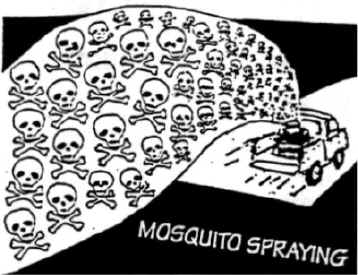 |
No Spray News James Irwin |
 |
No Spray News James Irwin |
April 15, 2002 Page 1
Columbia to Switch Mosquito Spray Insecticides
Are Pesticide Salesmen Determining Columbia's Public Health Policy?
Columbia chief sanitarian Larry McCall told me on March 13th that the city would be switching over to a different insecticide, permethrin, in the coming year. (Of course, I still hope that the city will be switching from malathion to nothing.) McCall said that one truck will continue to spray malathion from existing stocks. I have not seen any formal announcement of this change. Mr. McCall told me that he decided to change insecticides after attending a mosquito control industry trade show. Apparently, when deciding what potential health risks you and your family should assume from mosquito spray- ing, the city of Columbia relies on the advice of pesticide salesmen.
The question I have been asked repeatedly is whether the new insecticide, permethrin, is a greater or lesser health risk than malathion. The fact is that there is so much that isn't known about the health effects of both of these insecticides that it is not possible to answer that question.
Although permethrin is not chemically related to DDT, it kills insects by the same mechanism as DDT. Like DDT (and malathion, for that matter), permethrin has a very low acute toxicity, and, as with these other two insecticides, there is a lot more to the story than acute toxicity. Permethrin does not bioaccumulate in mammals; it has a half-life of 4-5 days in brain and body fat, according to Extonet.
Evidence of Immune System Effects
Effects on the immune system appear to be the number one concern with permethrin. Tucked into Extonet's rather benign evaluation of this insecticide is this rather startling sentence:
Very low levels of permethrin in the diet of chickens (0. 1 ppm for 3 to 6 weeks after hatching) have been reported to suppress immune system activity [9].